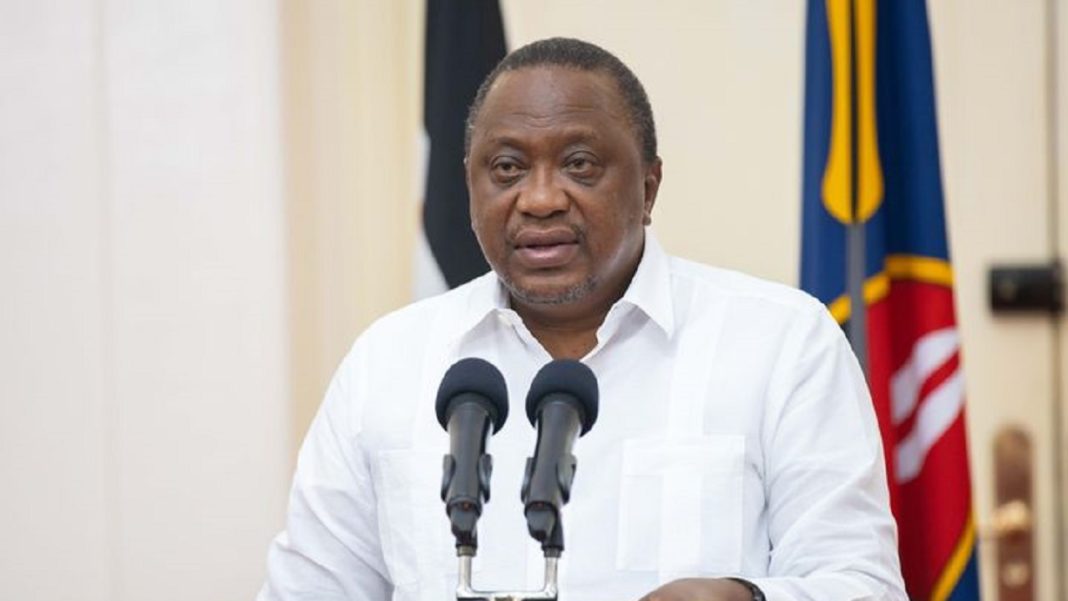Fellow Kenyans,
Distinguished Guests,
Ladies and Gentlemen,
It gives me great pleasure to join you today for the official opening of the 7th Annual Devolution Conference here in Makueni County.
I wish to thank the County Government of Makueni for accepting to host this important event, and the people of Makueni for the warm welcome they have accorded us.
Ladies and Gentlemen,
Devolution Conferences have become a key platform through which both National and County Governments come together, reflect upon, evaluate, and benchmark their performance on policy and implementation, the legislative framework, accountability, and service delivery.
The Conferences are also an opportunity for the two levels of government to demonstrate commitment and rededicate to co-operate and work together to achieve the dream of devolution.
Ladies and Gentlemen,
Of all the programmes Kenya has implemented since independence to spur socio-economic development, devolution has had the deepest and most far-reaching impact on the lives of Kenyans. Indeed, today the devolution achievements and dividends are a visible reality in all parts of the country. Everywhere you go across the country, you find more empowered communities and note major improvements in infrastructural development, health care and basic services, as well as service delivery.
In the last decade, we have come a long way on the devolution journey, but it remains work in progress. To deliver on the promise of devolution to Kenyans, we need to build on the successes to strengthen areas where progress has been slow. In this regard, I would like to highlight two areas where stronger cooperation and coordination between the National and Country Governments could enable us to reap the devolution divided faster and more effectively.
The FIRST is to build on the solid public finance management legal framework we have to ensure the distribution of resources between and within regions is more equitable; and to focus more sharply on getting better value for money.
The SECOND is to work towards becoming a truly responsive government, by promoting and increasing accountability at all levels, and ensuring that citizens are actively engaged in decisions and actions, that impact on their lives.
Ladies and Gentlemen,
Such an enhanced spirit of co-operation, co-ordination, inter-dependence, and support between, and amongst ourselves, has served us remarkably well since March 2020; when COVID-19 first case was reported, in Kenya. The two levels of government swiftly came together, forged a formidable alliance with our private sector, development partners, and faith-based institutions, and formulated a comprehensive action plan to win the war against the Pandemic.
And as these efforts including the nationwide vaccination campaigns continue, I have no doubt that we shall win this fight.
This is the approach, which we should take to tackle new challenges including the challenge of climate change, the theme of our conference this year.
Ladies and Gentlemen,
Turning to the 7th Annual Devolution Conference, I am delighted to note that the Conference theme focuses on climate change, specifically the Multi-Level Governance for Climate Action. I further note that the aim is to strengthen sub-national governments for them to act on climate change through development of more robust and focused execution of mitigation and adaptation strategies.
Climate change is not a future problem but a present and serious threat to all countries across the world. Climate change poses an existential threat to Kenya even though our role in precipitating the problem is negligible – we contribute less than 1% of current global greenhouse gas emissions.
To understand the gravity of the climate change threat, consider these numbers:
Globally, Kenya is ranked as the 31st most vulnerable country to climate change.
Climate change impacts lead to a loss of about 3% of the Gross Domestic Product (GDP) annually.
In the last two years, we witnessed the worst locust outbreak in 25 years, which left about one million people food-insecure in the Horn of Africa.
The rising water levels of the Rift Valley Lakes, Lake Victoria and Turkwel Gorge Dam have displaced nearly 400,000 people in thirteen counties and affected biodiversity, including flamingoes in Lake Nakuru.
And as we meet here today, about 2.5 million people in 23 counties, are facing famine because of drought.
Recognizing that no single nation can alone manage the challenges of climate change, the world has come together and established the United Nations Framework Convention on Climate Change. Kenya is signatory to the UN Framework Convention and has participated and made significant contributions during the just concluded UN Climate Change Conference in Glasgow, United Kingdom which some of you participated in.
Ladies and Gentlemen,
At the national level, my Administration has adopted a comprehensive set of policies, rules, and procedures to address climate change. This effort, as you are all aware, has culminated in the development of the following key instruments:
The Climate Change Act (2016).
The National Drought Management Authority Act (2016).
The National Climate Change Framework Policy (2018).
The National Climate Finance Policy (2018).
The National Climate Change Action Plan (2018-2022).
The National Adaptation Plan (2015-2030); and,
The Green Economy Strategy Implementation Plan (2016-2030).
These policies are currently being mainstreamed through the sectors in forestry, agriculture, water, energy, waste management and health. It is important to underscore that since most of these functions are devolved under schedule 4(2) of the Constitution, it is critical that the two levels of government work closely if we are to execute them effectively.
This effort, Ladies and Gentlemen, reflects Kenya’s resolve and desire to play its part in the international community’s efforts to address climate change, including preventing global temperatures from rising above 1.50 Celsius. Further, Kenya recently joined the Adaptation Action Coalition and the UN Call for Action on Adaptation and Resilience.
By partnering with these two institutions, we are sending a clear political statement that Kenya will continue to work with other like-minded governments, institutions, business, and civil societies to accelerate action to moderate the negative impacts of climate change, facilitate adjustment to expected climate impacts and strengthen capacity to absorb, and recover from climate change effects.
I note with appreciation, that 33 County Governments have developed County specific laws on climate change, and that a few of them are providing strong leadership on this agenda. Allow me to cite the counties of Makueni, Wajir, Garissa, Isiolo and Kitui, which have established policies and supporting legislation on climate change. They also have established climate change units; and put into operation a Fund for climate change mechanism.
Ladies and Gentlemen,
The National Climate Change Action Plan (2018 – 2022) spells out bold strategies that put us on a sustainable growth path. It further underscores the need for adaptation and enhanced climate change resilience for vulnerable groups including women, youth, persons with disabilities, and the marginalized communities.
One of the key deliverables in the Action Plan is to increase our forest cover in the medium term, from approximately 6.9% of our land area to at least 10% by 2022. This is in line with the Constitution, with respect to maintaining a clean and healthy environment for all. We indeed have an obligation to ensure that our environment is protected and conserved, not just for us but for the benefit of the future generations.
I am delighted to note that in the recent past several counties have participated in tree planting exercises. They include, Kajiado, Kiambu, Kisumu, Kitui, Marsabit, Murang’a, Nakuru and Tharaka Nithi. I urge and remain confident that the other 39 counties are preparing to follow suit.
Both the National and County Governments will continue working together through the support of the National Climate Change Council, to achieve the 10% forest, and protect our water towers and wetlands.
The Ministry of Environement is targeting providing at least 42.5 million seedlings per county, which would bring the total to the two billion target required to take Kenya to 10% forest cover.
Ladies and Gentlemen,
Our nation has a pioneering and commanding lead in climate change action in the continent. For example:
Kenya is a leader in the generation of renewable energy. We are ranked fifth globally on geothermal energy where our potential stands in excess of 10,000 MW, while only 10% of has been exploited to date.
We are using innovative approaches to expand access to energy through off-grid solar power and other clean cooking energy sources, with the aim of delivering 100% clean cooking energy sources by 2028.
The Turkana Wind Power is now fully operational; with an output of about 310 MW of clean energy. This undertaking is the biggest such installation in Africa.
Kenya has outlawed use, manufacture, and importation of single use plastic bags, as a way of protecting and conserving our environment. The two levels of government are investing on sustainable waste management projects to achieve a net zero plastic waste by 2030.
Several counties, including Nairobi, Kisumu and Mombasa have started reclaiming green urban spaces. Nairobi has successfully reclaimed Michuki Memorial Park, the Nairobi Arboretum, and the Nairobi City Park. I encourage other counties to explore opportunities to create green urban spaces.
Ladies and Gentlemen,
Implementing these policies and programmes requires substantial financial resources. Kenya has committed to reduce her greenhouse gas emissions by 32% by 2030. This will cost Ksh. 6,874 billion (US $ 62 billion). Out of this figure, Kenya will mobilize 13% from domestic sources, while we expect fund the balance of 87% from the external sources.
We are hopeful that, unlike previous conferences, the Glasgow Climate Change Conference will deliver on funding commitments, which we will attract into a Green Climate Fund. We will also be seeking to attract green investments such as the electric boda bodas, launched last week, and to tap into innovative finance such as blended financing to de-risk private investment. These efforts will open new avenues for green manufacturing and new job opportunities.
Ladies and Gentlemen,
We have a strong policy and institutional framework for the two levels of government to work together to adapt to climate change and reduce the threat that it currently poses to our country. Going forward we need to strengthen collaboration and coordination on:
Leveraging on digital technologies to provide real time climate related data and information to farmers and other stakeholders.
Raising awareness and building capacity especially on adaptation with a particular focus on women; who are at the heart of our crop and livestock production and who also are the most affected by the adversities of climate change.
Sharing information and good practice examples on mitigation and adaptation. Such examples include climate resilient projects such as mangrove restoration in Gazi at the Coast, the Masue Rock Catchment and Ngai Ndethya Sand Dam in Makueni County and Kinna Livestock Laboratory in Isiolo County.
Development and implementation of county spatial plans with a climate change lens.
As the Chairman of the National Climate Change Council, I will personally remain in the forefront, to ensure that our desire to achieve a low carbon resilient and prosperous future; is realized.
With those few remarks Ladies and Gentlemen, it is now my pleasure to declare the 7th Annual Devolution Conference, officially open.
Thank You and God Bless Kenya.



